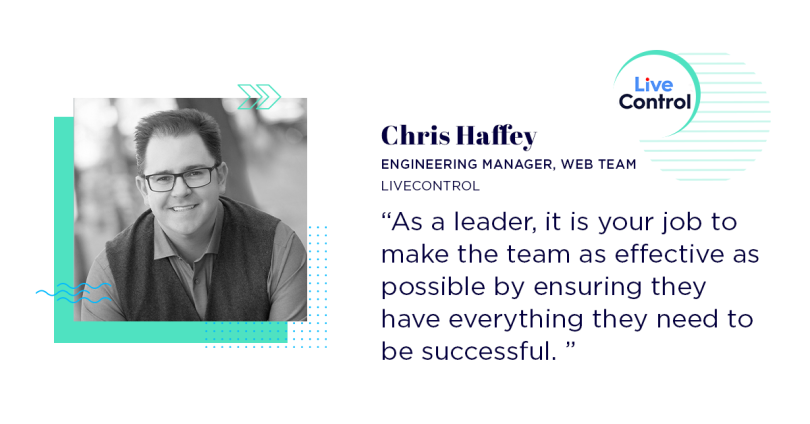Selecting rising managers isn’t as simple as reviewing a resume for technical skills and accomplishments. Many of the soft skills that go into leadership are learned over time, through trial and error. When so much of being a manager involves balancing and tailoring people skills, it isn’t difficult to understand why the “bad manager” trope is so relatable; according to a recent Gallup study, only about one in 10 people have the right traits and talent to be a good manager. While somewhat discouraging at first pass, when put in a more positive light, these are characteristics that can be acquired and refined over time.
So how can new managers elevate their leadership skills for a stronger team?
According to Simon Wong, director of software engineering at Omaze, empathy is key to success. His experience as an engineer helped him develop his skills in objective communication; he quickly learned as a manager, however, that “communication is more nuanced” when it comes to aligning multiple stakeholders. Mastering this grey area requires stepping into another’s shoes, identifying the best way to convey information, and leaning on empathy to understand unique needs and communication styles.
For Chris Haffey, engineering manager at LiveControl, learning how to delegate has been integral in his leadership journey. Handing over control jumpstarts a powerful and positive loop of autonomy — the more autonomy a team receives, the more their manager is able to confidently delegate, leading to even more trust and autonomy, and so forth.
Each of these six engineering leaders emphasize people skills as the driving force behind their success. Unlike technical talent, where objective results tend to indicate the level of skill, there are many ways to cultivate the soft skills good managers need to succeed. When leaning on and developing these skills, personalized leadership styles are free to take shape.

Learn to trust and delegate
“Even as a team lead, I found myself executing most of the time. It wasn’t until long after I was officially managing that I realized I was still trying to do my individual contributor job on top of managing, and the team suffered. As a people leader, it is your job to make the team as effective as possible by ensuring they have everything they need to be successful. That means handing over technical control and trusting your engineers, which gives you the ability to shift gears and focus on finding ways to improve the process. It all starts by relinquishing control of what you’ve most likely spent much of your career protecting until this moment, all so you can wholly focus on empowering your people.”
Chris Haffey is engineering manager on the web team at LiveControl.

Foster trust
“The foundation of every strong engineering team is built on trust. It is critical to foster trust in three areas: with your team, with your product and design managers, and with your stakeholders.
When it comes to your team — most engineers have pretty simple needs. They want to work on cool technology and products, feel respected and have fair compensation, learn and grow their abilities, and make an impact. Trust is the positive feedback loop that creates a strong team. Meeting needs leads to trust and open communication, which in turn leads to identifying and meeting new needs, and so on.
Successful products are built by a combination of engineering, product and design; trust between these three disciplines creates an environment of give and take that leads to rapid iteration and scalable engineering design. Without that trust, engineering becomes protective of the codebase, and product becomes frustrated with a lack of quick iteration.”
Jake Dluhy is head of engineering at ProducePay Inc.

Work on your teams, not in them
“It’s standard advice for business owners but is excellent for engineering leaders. When this realization clicked for me, it transformed how I approached my work, and ultimately, my teams.
Leaders that are too tactically focused within their teams risk, at best, becoming a bottleneck slowing down their team’s efforts, and at worst, can disenfranchise team members by solving all problems for them. This removes ownership and opportunities for growth.
A helpful question to ask is: Are you currently solving an isolated problem? If so, you’re likely working in your team. Instead, expand your focus and categorize the isolated problem into a broader set of issues facing your team, and solve that problem.”
Rick Hecker is a senior director of software engineering at Appetize.

Look to achieve trust over perfection
“When I transitioned into management, I was coming from a position as the most senior individual contributor on the team. I felt I would become an effective manager by having the authority to improve engineering maturity and to uphold our engineering standards. At first, this seemed to add more structure. But with every problem I would create another standard the team had to follow. When conflicting ideas arose, I wouldn’t back down — I always thought my solution was the better solution. Eventually this caused the engineering team to no longer propose their own ideas and instead would ask me for my decision on any new problem, which affected their ability to research and solve future problems.
After this realization, I decided to restrict my input (unless requested) in architecture and planning meetings to see how the team would handle the task on their own. Our velocity started to improve, initial deadlines were met and the team was more collaborative with each other.”
George Bland is a director of engineering at PatientPop.

‘You don’t get to look good and grow at the same time.’
“Professional and personal growth do not need to be separate areas of our lives. Our workplaces offer opportunities to develop, mature and grow as human beings. When we show up with vulnerabilities, we invite our coworkers and our friends to help us grow.
Every day as developers, we submit code with a posture that demonstrates that we want to improve our craft. We don’t wait until the pull request (PR) is perfect before pushing. That simple willingness to be in a vulnerable posture and receiving formative and detailed feedback has enriched my career and code many times over.
As we review a PR, we consider the author, and we use empathy to effectively communicate our constructive, pointed and encouraging feedback. We need to be willing to give input with care for our fellow human beings. If we embrace the same posture of vulnerability that we take when pushing PRs, and put ourselves in a position to receive feedback about our personal growth and character in the workplace, we become better people for it.”
Dave Laird is a senior engineering manager at AuditBoard.

Empathy is key
“If you came from an engineering background as I have, communication in engineering is typically objective. Presenting ideas based on solid evidence can be sufficient to generate alignment amongst a group of peers.
As a manager, the communication is more nuanced. You need to build alignment with various stakeholders, like HR and product. Here, presenting complex engineering evidence will not get you very far. At best, you get a tacit approval. At worst, you create confusion.
I have found success with applying generous amounts of empathy. Here, empathy means building alignment from the stakeholder’s perspective. What are their pain points? What stakeholders are they accountable to? What shared context can we build from? Learn their lingo and use it to establish a common context. This involves putting yourself in their shoes and reflecting on what success means to everyone. This is also a great opportunity for your career, as you learn about new domains and become more well-rounded.”
Simon Wong is a director of software engineering at Omaze.




